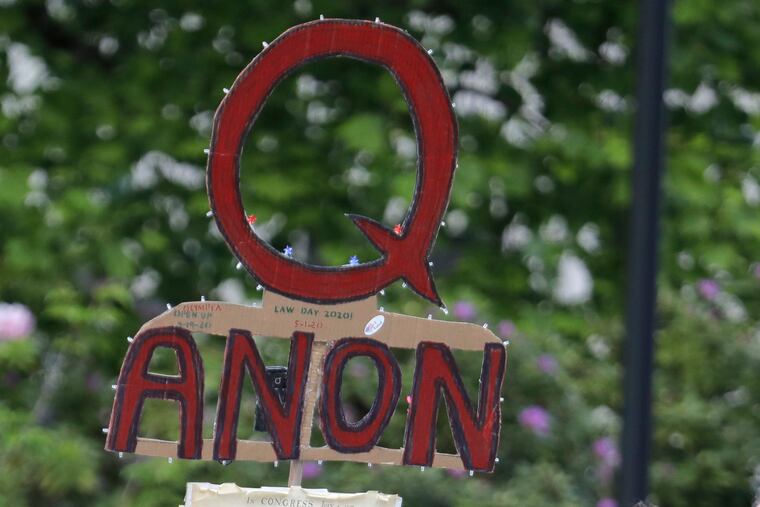House votes to condemn baseless QAnon conspiracy theory
The online movement identified as a potential domestic terrorist threat by the FBI has gained traction with some in the Republican Party.

WASHINGTON - The House voted overwhelmingly Friday to condemn the baseless QAnon conspiracy theory as the online movement identified as a potential domestic terrorist threat by the FBI has gained traction with some in the Republican Party.
The vote was 371-18 for the resolution sponsored by Reps. Tom Malinowski, D-N.J., and Denver Riggleman, R-Va., and came days after Malinowski said he received death threats from QAnon supporters after a false GOP ad accused him of lobbying "to protect sexual predators."
Seventeen Republicans and one independent voted against the resoultion condemning QAnon, a pro-Trump conspiracy theory that has been a central vector of misinformation about the coronavirus, on the same day President Donald Trump said he and his wife had tested positive for the virus. Adherents of QAnon believe Trump is battling a cabal of "deep state" saboteurs who worship Satan and traffic children for sex. In August, Trump gave a major boost to the baseless theory, saying that he appreciated the support of its followers, calling them "people that love our country."
QAnon, which took root on anonymous message boards in 2017, has been identified by the FBI as among the extremist views "very likely" to motivate violence. Its adherents, according to law enforcement, have been arrested in numerous incidents, including two murders, a kidnapping, vandalism of a church and a heavily armed standoff near the Hoover Dam.
Malinowski said he has faced attacks online from QAnon supporters and received threats after the National Republican Congressional Committee ran an ad that falsely said Malinowski tried to block a provision in a 2006 crime bill that would have expanded registration requirements for sex offenders.
Malinowski, a freshman who worked on national security issues in the Clinton and Obama administrations, was the director of Human Rights Watch from 2001 to 2013.
"If you've seen extra vitriol on my social media, here's why: the "Q" persona dropped a statement targeting me, citing the discredited NRCC (GOP SuperPAC) attacks on me & my resolution condemning QAnon. My office has gotten 6 death threats since yesterday," Malinowski tweeted this week.
Speaking on the House floor Friday, Malinowski warned of the threat of QAnon.
"Conspiracy theories, just like this one, have fueled prejudice, terrorism, even genocide and today, social media is fanning the flames," he said.
The resolution "condemns QAnon and rejects the conspiracy theories it promotes," while encouraging the FBI and law enforcement to focus on preventing violence, threats and harassment by extremists motivated by fringe political conspiracy theories. The measure also outlines a vision unlikely to be fulfilled - urging Americans, regardless of their political leanings, to seek information from authoritative sources and debate from a "common factual foundation."
In his remarks, Malinowski alluded to the political gains of QAnon adherents.
Marjorie Taylor Greene, who has endorsed the baseless theory and made several other racist remarks on video, won a GOP primary runoff in Georgia's heavily Republican 14th Congressional District in August, and has a clear path to becoming QAnon's first devotee in Congress. Last month, her Democratic rival in the GOP-leaning district dropped out of the race, citing personal reasons.
Malinowski condemned other conspiracy theories. He added: "Only one of these threats is considered a terrorist threat by the FBI. Only one is winning elections."
The 17 Republicans who rejected the resolution came from 12 states. They included Reps. Rob Bishop of Utah, Steve King of Iowa, Paul Gosar of Arizona, Daniel Webster of Florida and Scott Perry of Pennsylvania.
Michigan Rep. Justin Amash was the independent who voted against the resolution. Rep. Andy Harris, R-Md., also a Republican, voted present.